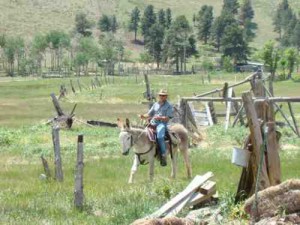Letter from Simon Halburian
Economy – January 2009 – Colorado Central Magazine
Editors:
In his “presidential platform” letter in the December issue, Slim Wolfe says “No more war, no more NATO, overseas bases, aggression, or aid, no Pentagon, no space program, no paranoid bullying. I ain’t afraid.”
He is no pacifist; a kind of idealist, maybe. Nothing wrong with that except he would leave us defenseless. The world scares me. I love the Pentagon.
Reader Wolfe also condemns equating wealth with money, With the possible exception of health, no one has ever equated wealth with anything other than money, platitudes notwithstanding.
Capitalism is good. Money reclining in banks is bad. Money in circulation is good. Reader Wolfe is correct that capitalism run amok can bring ruin. It must be regulated, but not excessively so.
I don’t mind CEOs making $10 million, if that’s what stockholders choose to pay. I have more of a problem with politicians making $150,000, plus all their perks.
Reader Wolfe advocates a crash program to end overconsumption, borrowing, and speculation. This is most fanciful. It presupposes a steady-state economy, a model which cannot be sustained. The laws of entropy always agitate for backsliding, disorder, and the eventual collapse of any system. Bad things happen all the time. Good things only happen when they are planned and coaxed along.
In order to ensure healthy economic growth, the Federal Reserve must constantly expand the money supply and take other measures to give it a sufficient velocity. The end result is on all our pockets.
For instance, each time a buyer signs off on a $200,000 mortgage, or a $20,000 car loan, the Federal Reserve promptly prints that amount and puts it in circulation. This is how money is created. Its velocity is controlled by interest rates
With stocks, bonds, other financials, reader Wolfe prefers that values be fixed, not subject to fluctuation and thereby, manipulation. In that case there would be no markets for these instruments since, without the prospect for gain, they wouldn’t be traded.
The national economy is very complex and must be studied like a science. I once sat beside a graduate exchange student on a flight from Tokyo. I said to him, “Three years is a long time. What will you be studying, medicine?” Imagine my astonishment when he replied, “No, the Federal Reserve.”
Simon Halburian
Saguache


